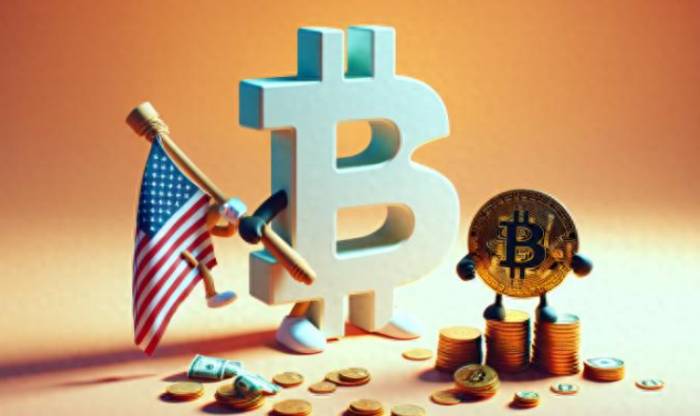The landscape of cryptocurrency is shifting dramatically, electrified by the recent nomination of Paul Atkins, a pro-crypto advocate, to lead the Securities and Exchange Commission (SEC). The announcement resonated positively within the crypto community, pushing Bitcoin's price beyond an unprecedented $100,000 for the first time since its inception. This surge is not only a milestone for Bitcoin but symbolizes a significant moment in the evolving relationship between government regulation and digital currencies.
On a Thursday market spree, Bitcoin enthusiasts celebrated as the cryptocurrency soared past the $100,000 mark, underlining its volatile yet monumental rise of over 40 percent since November 5. This remarkable increase equates to an astounding gain of more than $30,000, contributing to an overall appreciation of approximately 135% year-to-date. These figures point to a burgeoning interest and investment in the cryptocurrency space as confidence appears to grow amid changing regulatory landscapes.
Atkins, anticipated to prioritize deregulatory efforts if confirmed, has pledged to ease the government's crackdown on digital assets. Ed Chin, an analyst at Parataxis, voiced a collective relief, stating, "As long as it's not the status quo, it’s a positive sign, whether it's Atkins or someone else in charge." His candidness reflects a broader sentiment among those in the crypto sphere, who have grown weary of stringent regulatory measures and seek a more welcoming environment for innovation.
Travis Kling of Ikigai remarked on Atkins’ suitability for the role, emphasizing his liberal economic views and clear commitment to bolstering cryptocurrency markets. Kling pointed out, "For cryptocurrencies, Atkins could be the ideal SEC chairman. He has strong libertarian leanings and has been explicitly empowered to support crypto; I have full confidence he will do so." This level of conviction coincides with burgeoning hopes that under Atkins' leadership, the U.S. could solidify its position as a global hub for cryptocurrency innovation.

Among the more ambitious proposals linked to Atkins' potential leadership is the idea of establishing a national strategic Bitcoin reserve, which has ignited fervent discussions. While some critics question the practicality of this approach, Jaret Seiberg from TD Cowen warned that positioning Bitcoin reserves against the esteemed status of the dollar may pose political challenges. "It’s very likely Bitcoin reserves will still be promoted on social platforms or referenced in speeches. But actualizing such a vision requires substantial political capital," Seiberg explained.
Atkins is poised to replace Gary Gensler, who undertook several enforcement actions against perceived misconduct in the digital asset landscape. These actions, widely credited for contributing to the significant market downturn in 2022, left investors reeling with considerable losses. There is a palpable anticipation that Atkins may foster a more nurturing regulatory environment moving forward, providing the spark needed for renewed interest and investment in cryptocurrencies.
In parallel developments, Russian officials made headlines during an economic forum in Moscow, asserting that no entity could ban the use of Bitcoin or other cryptocurrencies. This statement served to reinforce a global narrative among crypto proponents that regulation might not be the barrier once thought. The comment appeared to ease worries around geopolitical disruptions, contributing to a spirited market recovery.
However, the global crypto landscape has not been without its recent challenges. Political turbulence in South Korea exacerbated risk-averse sentiment, creating notable price discrepancies between Bitcoin and other digital tokens like XRP and the increasingly popular Dogecoin. Recently, South Korean President Yoon Suk-yeol faced significant backlash after declaring a state of emergency, driven by escalating tensions with opposition parties. Although he rescinded the order shortly thereafter, the financial markets were left in turmoil, and Bitcoin trading in South Korea momentarily dipped below $72,000, illustrating how political climates can swiftly alter market conditions.
Despite these fluctuations, the broader cryptocurrency market demonstrated resilience, achieving a record surge as evidenced by CoinGecko’s data. The cryptocurrency market capital saw an influx of approximately $1.3 trillion, evoking memories of the bubble-like fervor experienced during the COVID-19 pandemic. By November 22, Bitcoin was tantalizingly close to the elusive $100,000 mark, only $300 away before experiencing a slight retreat.
The month of November illustrated unprecedented fervor in the cryptocurrency space. Trading volumes soared to all-time highs, showcasing more than $10 trillion in turnover across centralized spot and derivatives exchanges. CCData's compilation indicates that trading activity doubled, grabbing the attention of financial markets worldwide. The marked uptick showcases an insatiable appetite among investors, demonstrating renewed confidence in the leading digital asset.
Conversely, detractors remain concerned about Bitcoin's notorious volatility, despite the impressive 135% increase this year. For instance, Meitu, a digital content creation firm, recently sold its entire holdings of Bitcoin and Ethereum for approximately $180 million, seizing what it deemed an opportune moment to realize significant profits. This highlights a persistent caution among even some of the most fervent advocates—an acknowledgment that while the bull run brings substantial opportunities, it can equally pose significant risks.
As the SEC gears up for a potential shift in investigative tone under new leadership, all eyes will be on the implications for regulatory measures surrounding cryptocurrencies. The dance between innovation and regulation continues as the cryptocurrency community collectively hopes for a more favorable landscape that promotes technological advancement while ensuring the protection of market integrity. The notion that Bitcoin could firmly establish its place in the financial ecosystem—and perhaps even challenge the supremacy of traditional currencies—is a tantalizing possibility that keeps stakeholders engaged and invigorated in this fast-paced realm.
Post Comment